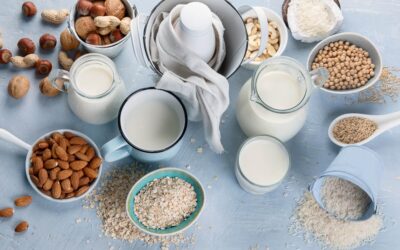As much as we love the time with relatives, there’s no doubt some people use this gathering as a means to ask their burning personal questions, which could very well involve doubting your decision to go dairy-free. Read through the dairy facts below, save this dairy facts page, and arm yourself with answers, so if asked, you can justify your choice with a solid yet polite response. Who knows, you might even convince a cousin or an aunt to reconsider a second serving of mac and cheese.
Dairy Facts: It’s Not A Health Food
Despite what the multi-million dollar dairy marketing campaigns have led most of America to believe, dairy does not do a body good. This is particularly relevant for the 65 percent of the global population who are lactose intolerant, meaning their body cannot properly digest the sugars in cow’s milk, leading to an array of digestive issues, including bloating, gas, stomach pain, and other uncomfortable symptoms.
Even for the 35 percent who are not lactose intolerant, cow’s milk can still cause health issues. Dairy has been linked to aggravating asthma symptoms. In fact, studies have shown that children who remove dairy and eggs from their diet see drastic improvements in their asthma symptoms in as little as eight weeks. Further, the Insulin Growth Factor 1 (IGF-1) found in all cow’s milk has been linked to a number of conditions and diseases, ranging from acne and eczema to more life-threatening ailments such as heart disease and cancer.
What’s Really In Milk
Milk is not a pure white beverage – it’s a concoction of artificial and natural elements secreted by a female cow. To increase production, cows are often fed steroids, which may be present in their milk. Even milk labeled with a “no added hormones” sticker can still contain natural hormones; the presence is inevitable since cows must be pregnant to produce milk, and pregnancy stimulates the productions of hormones like estrogen. Pus is another natural element found in cow’s milk. While the amount is small (about one drop in a full cup), the thought of drinking pus is generally disturbing, especially when considering that it came from an infected udder.
What’s not in milk? Calcium your body can use. The human body can’t absorb the calcium present in milk on its own – that’s why all commercially sold cow’s milk in the United States is fortified with vitamin D. What’s more, cow’s milk also contains high levels of phosphorus, which consumed in excess (three glasses of milk a day, for example), can lead to resorption of calcium from the bones. Cow’s milk doesn’t build strong bones – it can break them.
Dairy Facts: The Environment
If you’d prefer not to bring up pus and steroids at the family table, you could offer up some environmental facts when your uncle asks why you haven’t touched his famous sour cream mashed potatoes. As of 2005, dairy cattle account for 19 percent of the total water footprint for all livestock. That’s just shy of one-fifth of all the animals humans use for consumption – chickens, pigs, turkeys, beef cattle, etc. Considering that approximately 2.1 million people face water scarcity every year, this is a significant statistic.
Further, the most comprehensive study to date on the impact of food and the environment has stated that ditching meat and dairy is the single most effective action one can take to lessen their environmental impact. It’s not taking shorter showers or biking to work that will prolong the life of our planet – it’s saying no to cow’s milk.
For more dairy facts, including the health and environmental implications, check out our “Why Ditch Dairy” page.








